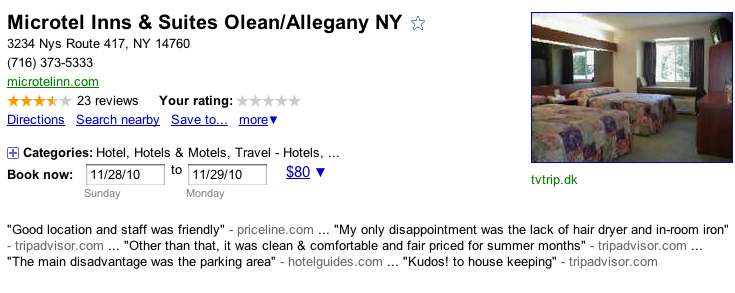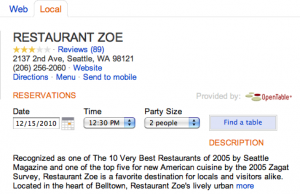Understanding Google My Business & Local Search
The Rubicon has Been Crossed -Local Pages as Transaction Interface
Yesterday was a seminal moment in Local. It largely went unnoticed but it reflects the rapid monetization of location pages by the major search engines.
Bing* announced a number of local, map and mobile upgrades that improve an already good, but under rated and under used product. Clearly, they are battling toe to toe feature wise with Google Places and will be giving as good as they get. It is nice to see their staying with Local and keeping in Google’s rearview mirror with a general purpose Local platform.
But the part of the announcement that caught my attention was the following:
Mobile (iPhone):
- Check-in: Share your current location with friends and family via Facebook, foursquare or Windows Live Activity Stream.
- Plans: From the Bing homepage or a local search result, people can plan a night out and share the plan with friends via Facebook, who can comment or join the plan.
- Opentable and Grubhub integration: With the integration of Opentable and Grubhub into Bing for Mobile, once you find your restaurant of choice, you can reserve a table on OpenTable or order takeout from Grubhub without leaving the Bing app.
Local enhancements:
- OpenTable will be integrated into the local search vertical, allowing people to book reservations from the restaurant details page in Bing.
- FanSnap will be integrated into the local search vertical, allowing people to purchase tickets to a concert or sporting event through the events details page in Bing.
These features when examined in conjunction with new features of the Google Places indicate the arrival of a new era for place pages.

You recall that recently Google Places’ started including hotel booking options directly on the Places page. These pages are now (finally?) becoming an entry point for financial and social transactions as opposed to just informational or contact based information.
In this role the search engines will be sitting between the customers and merchants or booking services. This change, while having been predictable, can affect many local business going forward in much the same way that the shift from cash to credit cards has affected them.
On the one hand, it will remove friction from the transaction while on the other, someone will be inserting themselves in the sale, with or without your explicit permission. It is a double edge sword and one that can be a net plus or not depending on how the search engines and social sites handle the process going forward. Historically, whenever a large corporation stuck out their hand in partnership to me, it inevitably ended up in my pocket and no longer felt much like a partnership.
Transparency is one way that could keep this from becoming totally unbalanced. But secrecy seems to be the order of the day as far as the Google Hotel booking system is concerned.
Does the new willingness of Google and Bing to sell on the brands of local merchants need to end up this way? No in fact, like the credit card it might actually increase bookings and sales for SMBs. It has the potential to remove a layer of blood suckers that currently exist in the affiliate world. But then again it seems that the power relationship is so uneven that as the demand of capital markets make their presence felt, more and more of the profit will go to the big boys…
*Full disclosure: Bing is a sponsor of many of our Get Listed University events.
© Copyright 2026 - MIKE BLUMENTHAL, ALL RIGHT RESERVED.




Comments
12 Comments
(since you asked, Mike :)) – I haven’t had time to dig into the new bing features yet, but they strike me as overwhelmingly positive for local businesses. Could bing grow the feature to the point they have some major sway over the businesses, then change the rules to screw them over? Sure, but add that to the list of a million hypothetical reasons you can shoot down any good idea. I say bring it on, unless there’s something I’m missing from not having read the fine print yet.
Google on the other hand seems like a mixed bag. I really like a lot of the changes they’ve brought about and think things like Hotpot could be really good especially after integrating with some other services and getting it to work on other platforms like the iPhone, which they have told me is high on their list.
The hotel transactions are a little bit scary, though, as are some of the AdWords features they’ve been testing out like lead generation directly on the site form or even their new call tracking. Removes a ton of friction, but who owns the data? Can you get all the info you want? Can you display selling points and disclaimers that you need to? Privacy questions, etc.? That’s not to say there aren’t benefits to these features – there definitely are, especially when (at least at this point) Google isn’t taking a cut. It just seems more mixed. And at least with AdWords, you have control over whether you want to opt into those features when they become available to you if you.
@Justin
I asked and am glad I did. 3 paragraphs is a lot meatier than a tweet!
Yes outcomes are unpredictable and I hope that I conveyed my ambivalence but general support of the idea (even if TripAdvisor doesn’t like it :).
As you reinforce, transparency is the only way to make these things work and Google often forgets that.
While I largely agree with you that Google disintermediating (one of the three new buzzwords from BIA Kelsey conference last week) thin affiliates is largely a good thing for SMB’s, making Place Pages transactional is only going to intensify the heat from stories like this one:
http://dealbook.nytimes.com/2010/12/15/is-google-too-big-to-shop/index.html
@David
It is true that no one has envisioned the scale that Google is contemplating…. an ad, an order, a booking, a piece of inventory from every local business every where in the world…. it is breathtaking and scary at all once.
Monopoly, though, is the nature of capitalism. What ends up happening in the regulatory worlds is monopoly wannabees gang up on monopoly success stories…in the end, the user, customer and SMB do not make out all that well there either…
It sure portends interesting times.
@David – Do you remember the Yellow Pages? There was a time, as recently as 2005 when Google and Yahoo launched local services, that the Yellow Pages were the only real game in town. The result was ridiculously high fees for smb advertisers and limited access points for consumers.
Having dealt with several sales reps over at Google with the Boost and Tags products I see the biggest issue being a huge conflict of interest.
What made Google the winner early on in the search wars was the implied fairness and quality of their search results. Recent changes and pushes to monetize the local results has, in my mind, blurred the quality of said results. If this trend continues Google will be opening the door to competitors who can take over the quality and unbiased nature of early Google.
For any of us who have been in the LSEO space as long as I have will agree that Google pretty much stinks for customer service. Until recently it has really only been us who have experienced it. More and more I am hearing from general consumers that Google seems a bit big and powerful. It will be interesting to see how this all plays out especially with new products that will further call on customer service expertise from big rainbow.
Facebook also has a real simple ecommerce capability on their pages too.
It’s apparently the space that everyone wants to occupy whether you are search engine or a social network.
@Kyle
Yes it is fertile territory as the long tail of local branded searches is very large in aggregate…. as are the discovery searches…. 2-3 billion a month on Google alone… and everyone of the large sites moving into local thinks that if they only get a few coins per each they will get rich…
@David
I have often wondered whether Google’s current approach to customer service will bite them in the end… things are just getting going, they have a chance to fix it but if they take their current path the will be burning a number of bridges
That Open Table link is a very, very scary thing for a lot of SMBs. Read a summary of the real cost of being listed on Open Table from SF’s Incanto.
No doubt, floral wire services (FTD, Teleflora, 1-800Flowers) would love a link to book flowers from a local florist like that – and harvest about 40% of the total price paid by the consumer (based on their current commissions and fees).
Disintermediation, indeed. The web should help consumers make direct connections with providers.
But this new move takes: Consumer —–> Merchant… to
Consumer —–> Search Engine (who now gets a cut???) —–> Marketing Firm (who also takes a big cut) —–> Merchant.
This is affiliate marketing gone mad.
@Cathy
Sometimes the current model in the hotel industry is
Consumer —>SE—>Affiliate—->Aggregator—-> Merchant
Google’s New Model
Consumer —>SE/SE Local—->Aggregator/Merchant—-> Merchant
In both cases, Google was receiving the advertising, not a direct cut.
In this particular case, the result is actually closer to the merchant… that being said, in some markets like restaurants Open Table is a new intermediary with it likely that Bing is receiving a cut.
That is what demonstrates the failing of the model. It isn’t disintermediation at all but reintermediation… adding a new, costly layer to the process.
I wish Bing would improve their customer service. I have a listing that has been waiting for 3 months to be published. No matter what I do or where I post for help the status stays “Pending Approval”.
[…] and similar products have slowly been moving towards becoming a transaction environment. Last November Google rolled out, on a limited basis, a hotel booking […]
[…] their still secretive hotel booking tool. All in all it is in impressive experiment with a subtle transactional nature. It is both more polished and definitely better looking than most Google experiments. It is very […]
Comments for this post are closed.